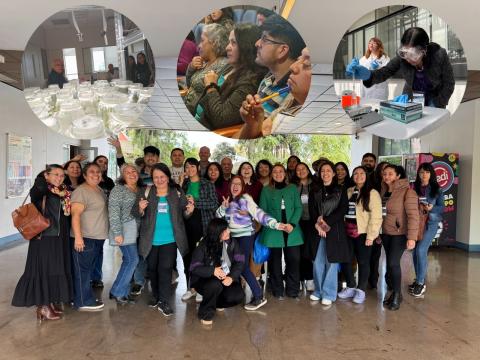
With the participation of teachers from various regions of Chile, the Center for Nanoscience and Nanotechnology (CEDENNA) held the tenth edition of “ProNano,” a training workshop in nanoscience and nanotechnology aimed at equipping educators with cutting-edge knowledge aligned with the new high school science curriculum.
The event welcomed participants with remarks from the Vice-Rector for Research, Innovation and Creation at Universidad de Santiago de Chile (USACH), Dr. Alberto Monsalve; the Director of CEDENNA, Dr. Juliano Casagrande; and the Executive Director of Fundación CEDENNA, Dr. Dora Altbir. They were joined by Pablo Brugnoli, Head of the Science and Society Division at the Ministry of Science, representing the government.
This year, ProNano was organized in partnership with the Explora Program, the National Network of Chemistry Teachers, the Santa Corina Local Education Service (SLEP), the Aprender Corporation, and the Strategic Engagement Department of USACH. Throughout the day, teachers took part in lectures by renowned researchers, participated in hands-on experiments, and toured high-level laboratories—all with the goal of bringing these scientific experiences and insights back into their classrooms.
“Our mission is to generate cutting-edge knowledge, develop technological innovations, and train top-tier human capital in the field of nanoscience and nanotechnology,” emphasized Dr. Casagrande. He noted that for this mission to succeed, “it is essential that the knowledge produced in our labs reaches society. In this sense, education plays a vital role.”
Dr. Alberto Monsalve, Vice-Rector at USACH, added that “CEDENNA's work is not limited to excellence in research; it also demonstrates a deep commitment to education and scientific outreach. Initiatives like ProNano are a testament to this, as they provide educators with updated tools and knowledge to share the wonders and applications of nanoscience with their students.”
Pablo Brugnoli highlighted the important role CEDENNA plays “in bringing frontier technology closer to teachers so they can pass it on to their students across Chile. This is especially meaningful because one of the core goals of our Science and Society Division, through the Explora Program, is to democratize science—making it accessible and meaningful to everyone.”
He added: “At the Ministry of Science, we’ve been working hard to promote a science that is not distant nor disconnected from people’s lives. A science that is lived, discussed, and practiced from within communities. And this begins with you—teachers—who hold the most noble and transformative role of all: to spark curiosity, open minds, and foster both critical thinking and hope.”
“Nanoscience may seem remote or abstract for those unfamiliar with it,” he said. “But you are here to prove otherwise—that it is possible to bring frontier knowledge into the classroom, transform it into pedagogical experiences, and turn it into opportunities for children and youth across Chile to engage with science not only as content but as a way of understanding the world.”
Albumin Nanoparticles
The event featured a unique and replicable classroom experiment: high school teachers from different regions participated in the production of albumin nanoparticles using egg whites.
“This activity can be directly replicated in the classroom using everyday, accessible materials. Through a simple process, teachers turn an egg white into a tangible example of frontier science,” explained Dr. Patricia Díaz, CEDENNA researcher in charge of the hands-on session.
Dr. Díaz elaborated that these ovalbumin nanoparticles—the main protein in egg whites—are similar to human albumin nanoparticles currently produced and widely studied as advanced drug delivery systems in the field of nanomedicine.
“These particles are biodegradable and safe. They are used in cancer treatments for controlled drug release and in procedures such as bone marrow scintigraphy, lymphoscintigraphy, and sentinel lymph node detection in patients with malignant melanoma or breast cancer. Because they are edible, ovalbumin nanoparticles may also be useful in the food industry,” she concluded.
ProNano: A Latin American Pioneer
ProNano is a pioneering initiative in Latin America that has become a benchmark in teacher training, providing high school educators with innovative tools to enrich their classrooms. In its tenth edition, the workshop includes lectures by leading scientists—including National Prize for Exact Sciences winner Dora Altbir—visits to specialized laboratories, and practical activities designed to enhance understanding of key nanoscience principles through replicable classroom experiences.
According to the organizers, this 2025 edition aligns with the new high school science curriculum, addressing the growing need for specialized knowledge in school education. Its objective is to empower teachers with methodologies and experiences that enable them to meaningfully incorporate nanoscience and nanotechnology concepts into their pedagogical practice.
- Log in to post comments







